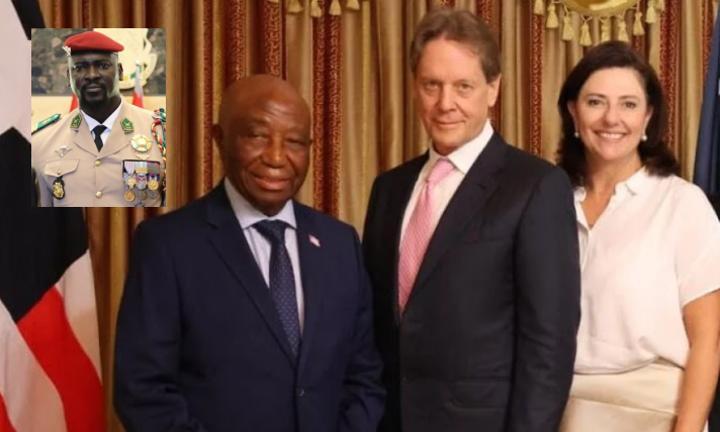Africa-Press – Liberia. The Government of Guinea is conspicuously silent as Liberia moves to ratify a major rail access deal that would allow Guinean iron ore to be transported through Liberian territory.
Lack of any position from Guinean officials is raising serious questions about the agreement’s viability and the diplomatic risks for both countries.
Last week, President Joseph Nyuma Boakai submitted to the National Legislature a 1.8 billion United States dollar Rail Access Agreement between the Government of Liberia and Ivanhoe Atlantic. The deal seeks to grant the company, which controls portion of the Nimba Iron Ore Project in Guinea through its subsidiary SMFG, the right to use Liberia’s Yekepa to Buchanan railway and port to export ore from Guinean soil.
However, FrontPageAfrica’s investigation shows that Guinea’s transitional administration has not granted approval for any such cross-border export. To date, no official communication has been issued by Conakry confirming consent for Ivanhoe Atlantic to move ore through Liberia.
According to sources with knowledge of past discussions between the two governments, several requests have been made to the Guinean authorities for clarity, but none has been answered. The continued silence from Guinea, even as Liberia advances toward ratification, leaves major uncertainty hanging over the future of the project.
FrontPageAfrica’s findings show that Guinea has over the last three years focused on completing its own multi-billion-dollar infrastructure known as the Trans-Guinean Railway, which will link the mineral-rich mountains of Simandou and Nimba to a deep-water port at Matakong. The 650-kilometer railway, valued at more than 18 billion United States dollars, is being developed through a partnership involving the Guinean government, Rio Tinto, and Winning Consortium Simandou.
The Trans-Guinean line is intended to give Guinea full control of its iron ore exports and to reduce dependence on foreign rail corridors. The project, which is near completion, is one of the largest investments in West African mining infrastructure and is expected to be operational by late 2025.
Based on documents and briefings reviewed by FrontPageAfrica, Guinea has maintained a consistent position in past that all minerals extracted from its territory must be exported through its own ports under Guinean supervision. This policy stance, reinforced by the ongoing Trans-Guinean Railway construction, makes the current Liberian deal appear inconsistent with Guinea’s strategic direction.
The Nimba Iron Ore concession operated by Ivanhoe Atlantic lies only about 67 kilometers from the new Trans-Guinean route. Engineering studies reviewed by FrontPageAfrica indicate that connecting the project to Guinea’s domestic railway would be less costly and more aligned with Guinea’s national transport plan than routing ore through Liberia.
For Liberia, the move to ratify the Ivanhoe Atlantic agreement despite Guinea’s silence introduces multiple risks. Should Guinea later reject or withdraw permission for cross-border exports, Liberia could face stranded rail capacity, disrupted operations, and diplomatic tension with its neighbor. The rail corridor between Yekepa and Buchanan, which already supports ArcelorMittal Liberia’s operations, could also become the subject of commercial disputes over access and usage rights.
FrontPageAfrica’s review of previous bilateral commitments shows that any export of Guinean ore through Liberia requires written authorization from the Government of Guinea under existing transshipment frameworks signed between the two countries. So far, no such authorization has been made public or acknowledged by either government.
This lack of confirmation leaves Liberia exposed to potential political and operational setbacks. The silence from Conakry, combined with Guinea’s near-complete railway, strongly suggests that the country intends to prioritize its own infrastructure for mineral exports rather than rely on Liberian routes.
Despite the unanswered questions, the Legislature is now reviewing the agreement submitted by President Boakai. FrontPageAfrica’s continuing inquiries to both the Liberian and Guinean governments have not yielded any evidence of a signed or written consent from Conakry.
As it stands, Liberia appears ready to open its rail and port system for Guinean ore exports even though Guinea itself has given no indication that it supports such an arrangement.
Until Guinea clarifies its position, Liberia’s decision to proceed with ratification remains a major diplomatic and economic gamble.
For More News And Analysis About Liberia Follow Africa-Press






